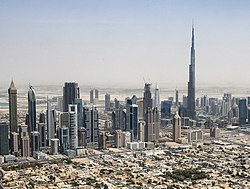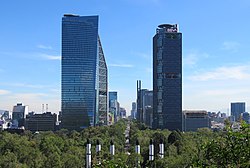Global city

Global city (also called world city, alpha city or center) is a concept of urban geography which applies to cities that meet a series of characteristics born due to the effect of globalization and the constant growth of urbanization. The most complex of these entities would be "global cities": those that have a direct and tangible effect on world affairs through more than just the socioeconomic environment, with influence in terms of culture or politics.
The term global city is attributed to the sociologist Saskia Sassen, author of the book published in 1991 The global city, in reference to London, New York, Paris and Tokyo, and in contrast to the term megacity. Numerous institutes, entities and publications classify global cities according to different criteria, whether economic, social, cultural or political.
General characteristics
- International recognition and promotion of the city. An example of this is the identification of the place or region, that is, the city's own name unequivocally.
- Influence and participation in international events and aspects of global importance, for example, the holding of major sporting meetings (the Olympic Games or the World Cup of Football), political or social, or the host of international organizations.
- To be center of a great conurbation and possess a population in the metropolitan area sufficiently large.
- Having an airport that works as an international connection centre, that is, having a large number of air connections with the big cities of the world.
- Have an advanced transport system (ferroviary, metro, buses, highways, etc.) interconnected within the city and with other capital cities.
- Have advanced infrastructure in the telecommunications world.
- Make it a cosmopolitan city.
- Having your own cultural environment, thanks to the existence of film festivals, musical events, art galleries, etc.
- To host various international companies and activities (ferias, organized markets) that define it as an important business city.
For some, London, New York, Paris and Tokyo have traditionally been considered the "big four" cities around the world not by chance, but they also serve as symbols of global capitalism. However, many people have their own personal lists, and it is likely that any of the lists will differ based on cultural background, values, and experience.
London
New York
Paris
Tokyo
Classifications

Since the beginning of the XX century the cities of London, Paris and New York have been considered the Three Bigs, that is, the main cities in the world that exerted great influence at a global level. However, since the second half of the XX century, this small group has been increased with the inclusion of Tokyo, Madrid, Shanghai, Hong Kong, Mexico City, Moscow, São Paulo, Beijing, Los Angeles, Rio de Janeiro, Buenos Aires, as well as several other cities in the rest of the world. The way to qualify whether or not a city corresponds to this concept of global city has been much discussed.
Global Financial Centers Index

The Global Financial Centers Index is a biannual ranking that measures the competitiveness of the world's main financial centers. The index is developed based on more than 29,000 ratings from an online questionnaire, along with data from more than 100 indices from organizations such as the World Bank, the Organization for Economic Cooperation and Development (OECD) and the Economist Intelligence Unit.
As of March 24, 2022, the main financial centers in the world among the 119 financial centers classified are:
Latin America
| Classification | City | Puntaje |
|---|---|---|
| 18 | 690 | |
| 53 | 633 | |
| 60 | 620 | |
| 70 | 599 | |
| 73 | 588 | |
| 79 | 568 | |
| 81 | 566 | |
| 110 | 523 | |
| 115 | 518 |
Global Cities Index

The magazine Foreign Policy, together with the consulting company A. T. Kearney and the Chicago Council on Global Affairs, publishes the Global Cities Index in English), a classification of global cities, based on consultation with Saskia Sassen, Witold Rybczynski, among others. Foreign Policy notes that "the world's largest and most interconnected cities help set global agendas, are able to confront transnational dangers, and serve as centers of global integration.. They are the engines of growth for their countries and the gateways to the resources of their regions. The classifications are based on the evaluation of indicators distributed in five areas: business activity, human capital, the exchange of information, cultural activity and political commitment.
In 2021, the main global cities were:
The Most Talked About Cities in the World
The World's Most Talked About Cities is a report published by ING Media, a London media company. The report ranks 250 global cities by the number of times they are mentioned on social media and in the online press.
In 2019 the most talked about cities in the world were:
The Best Cities in the World

The classification of The Best Cities in the World ("The World's Best Cities" in English) is produced by the real estate advisor, Resonance Consultancy, which evaluates each city according to six criteria: the place (" perception of the quality of the city's natural and built environment"), the product ("key institutions, attractions and infrastructure"), the programming ("arts, culture, entertainment and the scene culinary"), the people ("diversity and level of immigration"), prosperity ("employment and corporate headquarters") and its promotion ("stories, references and reviews shared online").
In 2021, the top 10 cities in the world were:
Global City Lab
In 2019 the Global City Lab published a ranking of the top 500 global cities, ranked by their brand value. According to this report, the ten most important global cities are:
Global Powerful Cities Index

The Institute for Urban Strategies of the Mori Memorial Foundation is a Japanese institute that publishes the Global Power City Index ("Global Power City Index" in English or "世界の都市総合力ランキング" in Japanese), a report annual survey of the world's most powerful global cities. Each city is classified according to six categories: economy, research and development, cultural interaction, quality of life, environment and accessibility, with another 70 indicators within these.
According to the 2021 report, the ten most powerful cities in the world are:
| Classification | City |
|---|---|
| 1 | |
| 2 | |
| 3 | |
| 4 | |
| 5 | |
| 6 | |
| 7 | |
| 8 | |
| 9 | |
| 10 |
| Classification | City |
|---|---|
| 9 | |
| 18 | |
| 40 | |
| 43 | |
| 44 |
Wealth Index

The City Wealth Index is an index published by Knight Frank LLP and Citi Private Bank that evaluates which are the most important cities for high-income people, defined as those with assets greater than the $25 million US dollars (22.6 million euros). According to the report, the most important considerations for such people are economic activity, political power, knowledge, influence and quality of life.
According to its 2021 report, the most important global cities are:
GaWC Study
The Globalization and World Cities Research Network (or "GaWC") is a British think tank that publishes a report every two years that ranks the world's cities according to their level of globalization and their connectivity to so-called "advanced services." such as accounting, advertising, banking, finance and law. The report gives more weight to economic aspects than to political, social or cultural aspects. According to these criteria, cities are classified into three city categories: Alpha (with four subcategories), Beta (with three subcategories) and Gamma (with three subcategories).
The report has been published continuously since 1998 with editions in 1998, 2000, 2004, 2008, 2010, 2012, 2014, 2016, 2018 and 2020. According to the 2020 report, the most important cities in the world are as follows:
(![]() (1) or (
(1) or (![]() 1) indicates that the city has risen or dropped from its ranking in the 2018 report.
1) indicates that the city has risen or dropped from its ranking in the 2018 report.
Alpha (2020)
Cities at the Alpha level are connected to the world's major states and economic regions and connected to the global economy. Alpha cities are categorized into four city subcategories: Alpha++, Alpha+, Alpha, and Alpha−.
Alpha++
Alpha++ cities are the cities most integrated into the global economy:
Alpha +
Alpha + cities are cities that are highly integrated into the global economy, providing advanced services to the global economy:
Alpha

Alpha −

Other criteria
Other criteria, not considered in lists such as those of the GaWC that are based on specific criteria and, therefore, may not include other globally significant cities, such as:
|
|
| Rank | City population | Metropolitan Area Population | Percentage of births abroad | Cost of life | Passengers in Metro | Extension of the railway system | Passengers per airport (2006) | Millionaires
(2019) | Gross Domestic Product |
|---|---|---|---|---|---|---|---|---|---|
| 1 | Karachi | Tokyo | London | Zurich | Hong Kong | Hong Kong | Beijing | London | Tokyo |
| 2 | São Paulo | Jakarta | Toronto | Seoul | Moscow | London | Chicago | Tokyo | New York |
| 3 | Moscow | Seoul | Los Angeles | Tokyo | New York | Tokyo | London | Singapore | Los Angeles |
| 4 | New Delhi | Mexico City | Vancouver | Hong Kong | Seoul | Seoul | Tokyo | New York | Chicago |
| 5 | Shanghai | São Paulo | New York | London | Mexico City | Madrid | Los Angeles | Beijing | London |
| 6 | Mexico City | New York | Singapore | Osaka | Paris | Moscow | Dallas | Paris | Paris |
| 7 | Seoul | Bombay | Sydney | Geneva | London | Paris | Paris | Seoul | Osaka/Kobe/Kioto |
| 8 | Istanbul | Los Angeles | Abijan | Copenhagen | Frankfurt am Main | Mexico City | Frankfurt am Main | Taipei | Mexico City |
| 9 | Bombay | Delhi | Miami | Moscow | Tokyo | New York | Atlanta | Zurich | Philadelphia |
| 10 | Tokyo | Osaka | Paris | Oslo/New York | Singapore | Chicago | Denver | São Paulo | São Paulo |
Contenido relacionado
Katanga Province
San Juan Puerto Rico)
Capital district
Groningen Province
Calouste Gulbenkian



